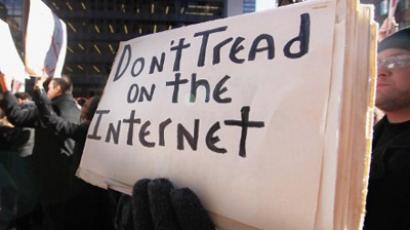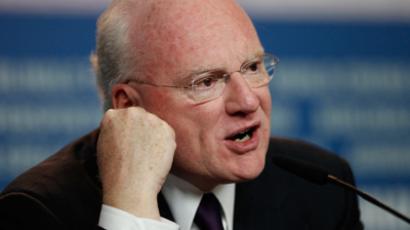CISPA is US ‘cyber-security loophole’
The readiness of the internet community to self organize for mass protests against censorship and online privacy curtailment has taken US legislators aback, believes Trevor Timm, web freedom activist from the Electronic Frontier foundation.
Since the Stop Online Piracy Act (SOPA) was halted in January, the wave of outrage has not ceased as the Congress gets ready to ratify another already-notorious bill.Angry internet users are protesting against the Cyber Intelligence Sharing and Protection Act (CISPA) web security bill pending in the US Congress. Web surfers fear the bill will make privacy a thing of the past. Trevor Timm spoke with RT about the bill.RT:The battle of control over the internet right now; who is winning and who is losing?Trevor Timm: It depends upon whom you ask. [Google co-founder] Sergey Brin talked about authoritarian governments, mentioning Saudi Arabia, China and Iran as examples of governments who are restricting internet so much that citizens cannot do what they want.In the US we have a different problem right now. The government is trying to go after privacy online with their new cyber security bill (CISPA).The problem of this bill is the companies will be able to skirt privacy laws. Normally they are restricted from handing information to the government without some sort of public cause. But in this scenario they would be able to use this cyber-security loophole to monitor your communications and hand them to the government voluntarily.We want to make sure that the constitutional protection in the US stays strong for those who are using the internet and emails to communicate. RT: There are some issues in the US regarding internet censorship and privacy aspects. What is being done here that concerns you?TT: Over the last year we’ve seen Congress is trying to produce actually over a hundred bills that would attempt to regulate the internet in some way. The biggest example is obviously SOPA (Stop Online Piracy Act), which thanks to large protests on January 18 was abandoned.The CISPA (Cyber Intelligence Sharing and Protection Act) bill attacks privacy in a different way than SOPA did, but it is still Congress trying to regulate the internet without really understanding why.There are lots of different ways governments (worldwide) can go after online freedom.What we want to do is all those tactics are exposed and hopefully people can respond.RT: The SOPA and PIPA (Protect IP Act) acts both failed because people finally understood what they were. What is the likelihood of CISPA? Do you think this will pass?TT: I think the Congress has at least learnt some lessons from the SOPA debate, which is mildly encouraging.When we were trying to stop SOPA the Congress would not return the calls… they were just trying to shoot it through the Congress without any debate whatsoever. Once they saw the power of the internet and how it can self-organize and really make a difference in the legislative procedure, they understood there has to be more understanding.Now the authors of SOPA are trying to disassociate themselves from the bill…claiming they want to continue to work with the civil liberties communities to make sure this is a better bill.We are running protests trying to convince the Congress to vote not on this bill until they take out these privacy destroying provisions.














